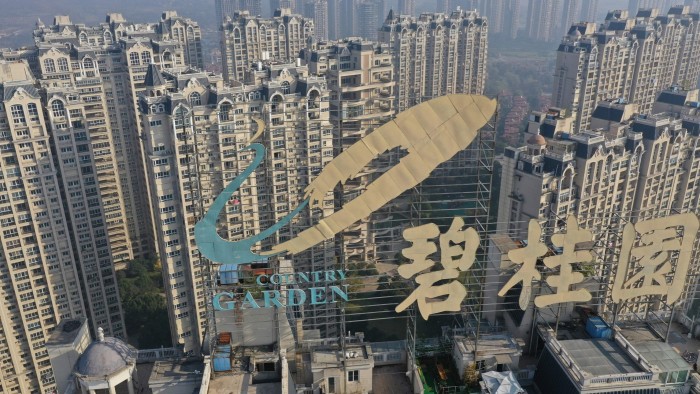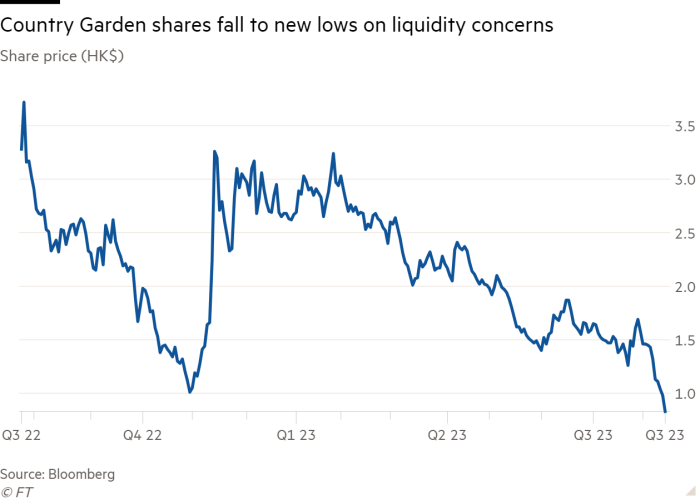China stocks hit after developer Country Garden suspends some bond trading

Roula Khalaf, Editor of the FT, selects her favourite stories in this weekly newsletter.
Shares in Country Garden slumped to a record low on Monday after the Chinese developer suspended trading in at least 10 of its mainland bonds, spurring a wider sell-off in property-linked stocks.
The company, formerly the largest developer in China by sales, missed international bond payments last week in a sign that a two-year liquidity crisis across the real estate sector was threatening to escalate.
Shares in the group fell as much as 18.4 per cent in Hong Kong following a statement released over the weekend that said several bonds issued by the company and its subsidiaries would be suspended from trading this week.
Shares in developer Jinmao Holdings also fell as much as 9.8 per cent after the company issued a profit warning late on Friday. A Hong Kong index tracking the mainland property sector dropped as much as 4.8 per cent, while the broader Hang Seng index fell 2.5 per cent and China’s CSI 300 shed 1.3 per cent.
One of the Shanghai-listed Country Garden bonds in question matures next month and was last trading at 27 cents on the dollar, compared with close to par in January this year when China lifted Covid-19 restrictions and investors were optimistic about a strong recovery in the world’s second-largest economy. The bond was trading at 50 cents a few weeks ago.

Until recently Country Garden was seen as a safer prospect than many of its highly leveraged peers. Its battle to survive is a crucial test of the health of China’s property sector, and Beijing’s policies towards it, as homebuyer confidence dips.
On Monday analysts at Morgan Stanley downgraded Country Garden to underweight, warning that the company’s “worsening liquidity may lead to higher chance of default in the near term”.
Beijing has so far stopped short of bailing out any of the country’s developers, dozens of which have defaulted since the failure of Evergrande in 2021, and focused instead on the completion of residential properties. But officials have stepped up their supportive rhetoric about the sector in recent weeks amid concerns over widespread defaults.
“Two weeks ago, the government insisted that it was going to support the property sector and that simply isn’t happening,” said Dickie Wong, head of research at Hong Kong-based Kingston Securities. “The next 30 days are going to be really critical for Country Garden.”
Beijing launched a deleveraging campaign in 2020 designed to cool overheating house prices. It limited access to credit at private homebuilders, who typically sell residential apartments before they are completed and rely on the rapid circulation of cash.
Evergrande, the world’s most indebted developer, last month disclosed losses of $81bn over 2021 and 2022, revealing the scale of the debt crisis at the company, which is going through an opaque restructuring process.
In a further sign of debt woes, multiple listed companies in China said in stock exchange filings over the weekend that they had not received payments due from companies linked to Zhongzhi Enterprise Group.
Country Garden on Friday said it would “spare no effort in self-rescue” as it disclosed expected losses of Rmb45bn-55bn ($6.2bn-$7.6bn) for the first half of the year. From January to July, its sales were Rmb140.8bn, down 61 per cent compared with the same period in 2021 before a sector-wide cash crunch took hold.
“You can see the shares tumbling and all they can do at the moment is stop trading to try and stabilise sentiment,” said Wong.
Elsewhere in the region, Japan’s Topix and South Korea’s Kospi both fell about 1 per cent.
Additional reporting by Wang Xueqiao in Shanghai
Comments